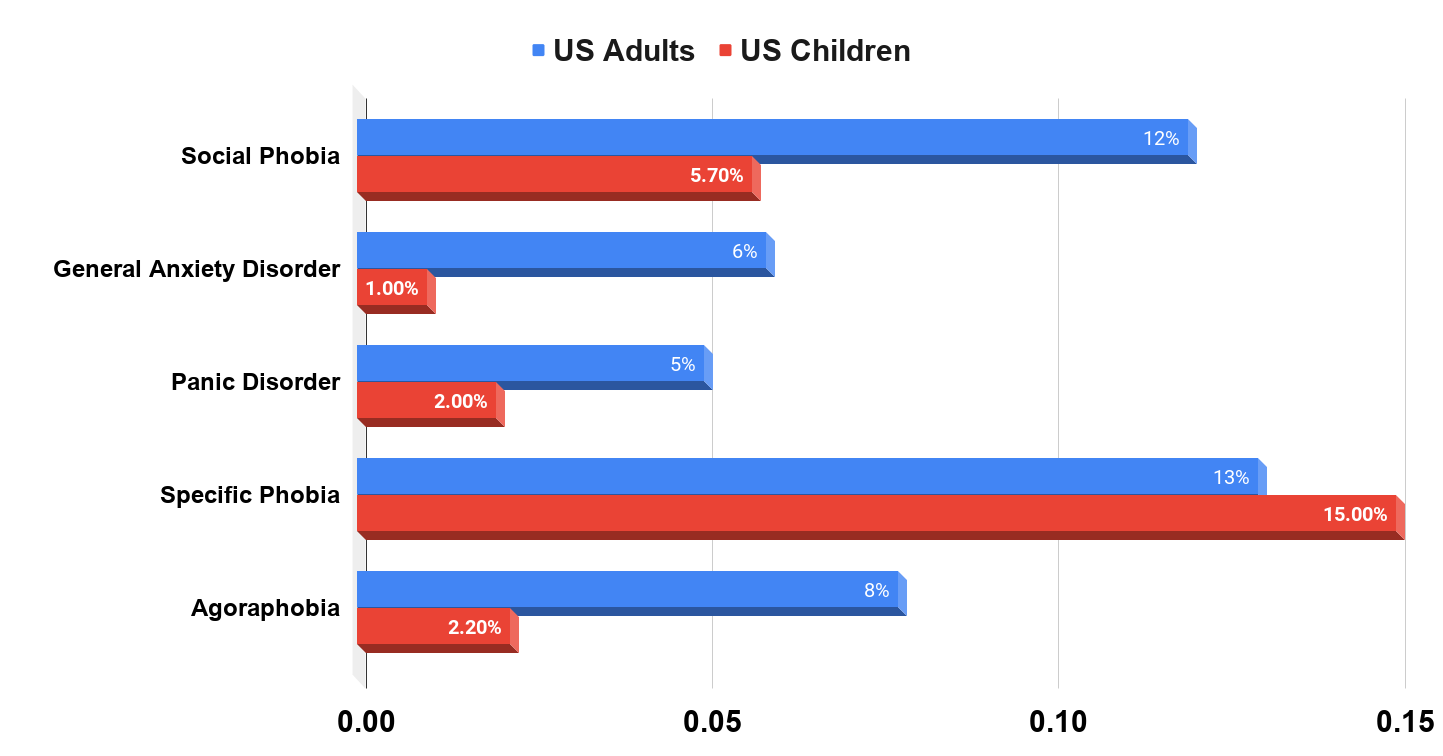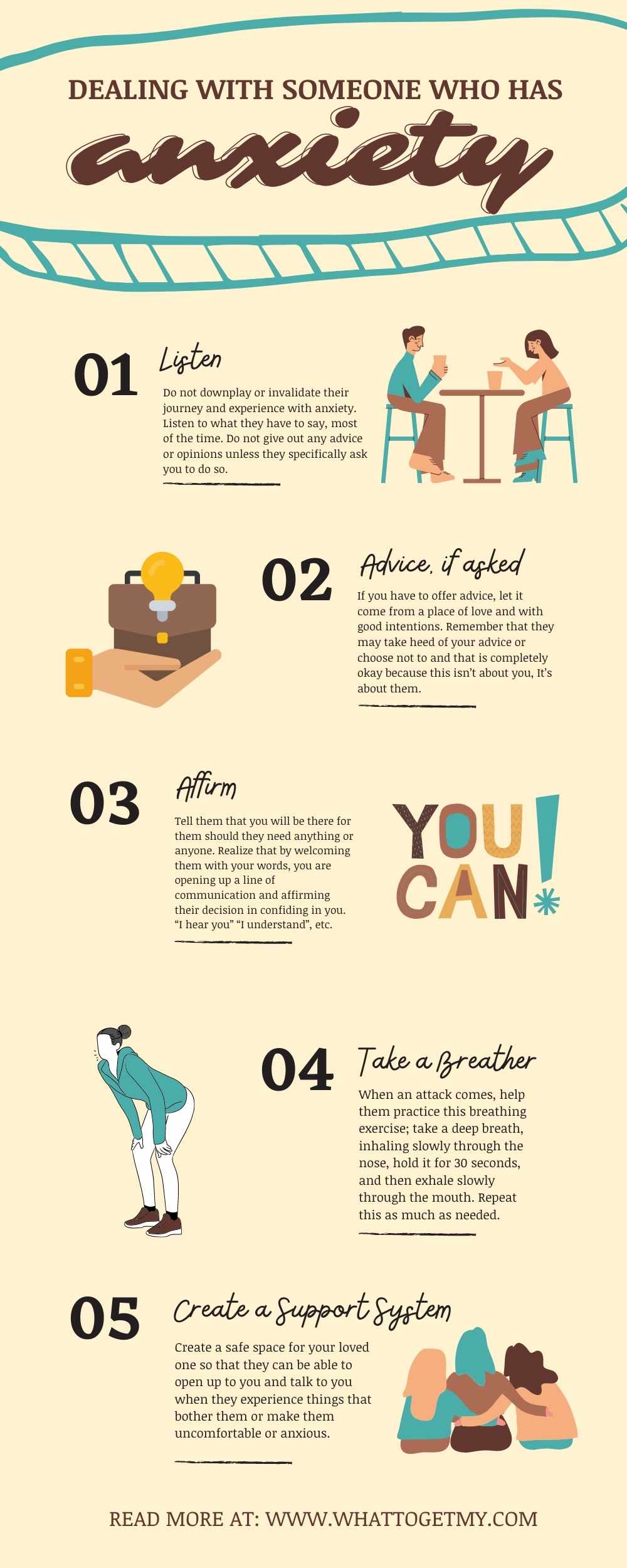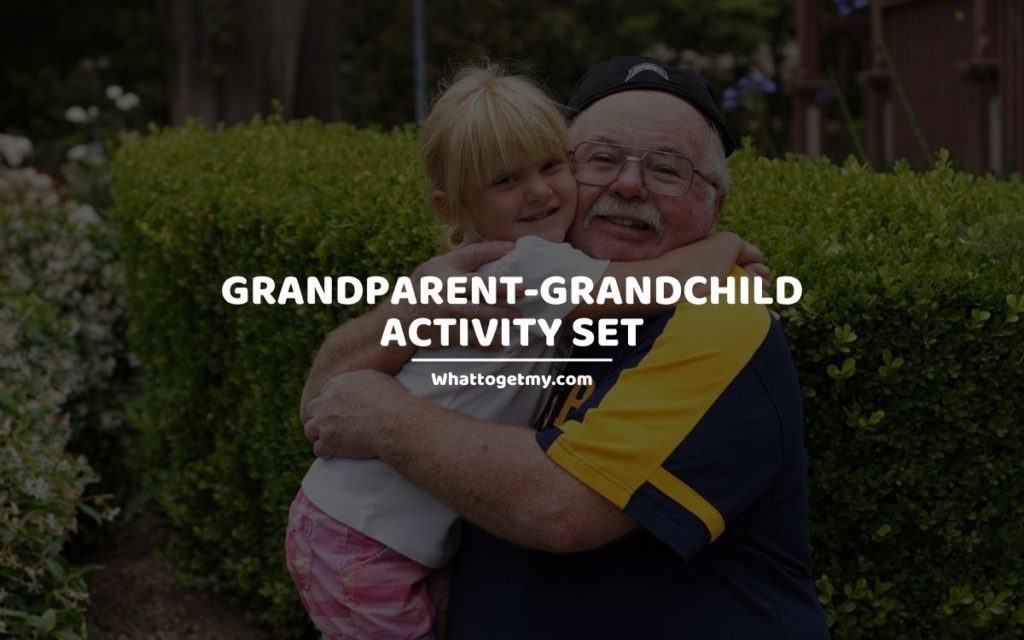How to Comfort Someone With Anxiety
WhatToGetMy Instructional Article
- Anxiety is a mental disorder that cripples people with fear and dread, leaving them in a constant state of worry over every aspect of their life.
- People dealing with anxiety experience discomfort in situations or places that most people have no problem being in.
- For this reason, make sure you practice empathy when dealing with people who have anxiety. Even if you do not understand their actions and reactions towards certain events, do not be quick to judge or dismiss their emotions.
Interacting with people who have anxiety can feel like walking in a minefield with a blindfold and no sense of direction, especially for people who have never experienced anxiety. And we are not talking about the “I don’t think I studied enough for that exam and I’m anxious about it” type of anxiety, no. We are talking sweaty palms, panic attacks in the middle of a conference room, or even “can’t leave my house” type of anxiety. Everyone has feelings of anxiety at some point in their life, but this article is focusing on Anxiety disorder which is the most common mental health condition in the United States and affects up to 18% of the population. Anxiety disorder is generally characterized by having extreme worries or fears that take over a person’s life to a point where they start affecting his/her daily life activities. When someone has anxiety, it is usually an indication of some other condition such as: panic disorder, phobias (agoraphobia or claustrophobia), post-traumatic stress disorder (PTSD), and social anxiety disorder (social phobia). Anxiety merely presents itself as a symptom for a bigger underlying issue.
What are the most prevalent anxiety disorders in the US?

Source: www.anxietyhub.org
In order for you to support someone with anxiety efficiently, you need to understand what it means to have an anxiety disorder. Knowing the signs of anxiety can help you realize when someone you love is having fearful thoughts or feelings.
WHAT CAUSES ANXIETY?
There are factors that cause some people to develop anxiety and not others, these are called risk factors.
1. Genetics:
You are more likely to develop anxiety disorders if someone in your family has (had) an anxiety disorder, more specifically one of your parents.
2. Environmental Stress:
Environmental factors such as money problems, racial discrimination, and general poverty increase the risk a person developing anxiety disorders. College students are among the highest group of people that develop anxiety disorders due to academic pressure.
3. Childhood Trauma:
People who went through some sort of childhood trauma are high risk of developing anxiety disorders especially if the trauma is never confronted or healed.
4. Low Self Esteem:
Having a low view of the self can affect how you see and relate to the world around you and this can result in anxiety disorders such as social anxiety where the person reclines back into themselves and shuts down the world for fear of being judged by others.
WHAT TO DO WHEN DEALING WITH SOMEONE WHO HAS ANXIETY
The first thing you have to understand when dealing with someone who has anxiety is that they are afraid; afraid of being judged, afraid of failing, afraid of disappointing others, and their fear is magnified in their minds. Because of this, the things that they worry about might seem minuscule to you but do not try to downplay their feelings in the moment even when you think they are “over reacting”. Here is what to do when someone close to you opens up about their anxiety disorder:

Use this graphic for free, just source us with this link:
Source Link: https://whattogetmy.com/how-to-comfort-someone-with-anxiety/
1. Listen:
A lot of the times when someone opens up to you it’s because they are looking for someone who will understand what they are going through and they have trusted you to be this person. Do not downplay or invalidate their journey and experience with anxiety. Listen to what they have to say and unless they specify otherwise, do not give out any advice or opinions unless they specifically ask you to do so.
2. Advice (if asked to):
If you have to offer advice, let it come from a place of love and with good intentions. Remember that they may take heed of your advice or choose not to and that is completely okay because this isn’t about you, It’s about them.
3. Affirm them:
Tell them that you will be there for them should they need anything or anyone. Realize that by welcoming them with your words, you are opening up a line of communication and affirming their decision in confiding in you. Words of affirmation can be “I hear you” “I understand” “I am here for you if you need anything else” “I believe you” “I love you” etc.
WHAT TO SAY TO A FRIEND WITH ANXIETY
Because people with anxiety experience and are consumed with fear that might seem illogical or irrational to others, it is important to know what to say to people with anxiety so you do not alienate them or trivialize their disorder.
1. I’m always here for you:
By saying this, you are providing a safe space for your friend. They know that if they ever feel overwhelmed they can count on you to help them through it. It gives them a sense of belonging and feeling accepted.
2. What can I do to help you:
By saying this, you are not only offering to actively help your friend, but also you are asking for consent on how best you can help them. Instead of assuming you know what your friend “needs to be doing” asking them how you can help makes them feel like they still have power over decisions in their life.
WHAT SHOULD YOU NOT SAY TO SOMEONE WITH ANXIETY
On the other hand, here are some of the things you should avoid saying to someone who has anxiety:
1. You are overreacting:
This is invalidating their feelings and experiences, what might seem like an overreaction to you, is a normal response to the situation for them.
2. It’s not that big of a deal:
As a rule, never say this to anyone (ever!), and especially not to someone who struggles with anxiety. It is condescending to assume that what they are going through is not impactful enough. Even if you do not understand it, be empathetic and consider how things might look from their point of view.
3. Get over it:
This might come across as you being selfish and you attempting to hurry the healing process along.
WHAT NOT TO DO WHEN YOU ARE LIVING WITH SOMEONE WITH ANXIETY DISORDER
Here is how you can help a loved one with anxiety when you share a living space with them. In as much as you want to create a safe living space for them where they feel comfortable and at home, you should also be able to help them adjust to their environment so that they do not develop a crippling fear of anything else that is outside of their comfortable space.
1. Do not be an Enabler:
This means that you should not change the environment or circumstances to fit the comfortability of your friend with anxiety. Instead help them integrate in society slowly and at a pace they can handle by trying different exercises that involve them participating in activities that trigger their anxiety.
2. Do not force confrontation:
During these exercises, however, keep in mind not to push people with anxiety further than they can go or are ready to when performing exercises. Start out small with activities that will not overwhelm them and grow as they progress.
HOW TO CALM SOMEONE EXPERIENCING AN ANXIETY ATTACK
Here is how you can calm down a person with anxiety
1. Breathing exercises:
Help them practice this breathing exercise; take a deep breath, inhaling slowly through the nose, hold it for 30 seconds, and then exhale slowly through the mouth. Repeat this as much as needed until breathing is regulated and the person experiencing an attack is no longer hyperventilating.
2. Counting down or reciting the alphabet:
This will shift their focus from whatever caused the attack to focusing on counting or reciting the alphabet. This exercise also works with music/song lyrics; you can either sing to them or they can sing along with you (depending on the severity of the panic attack)
3. Breathing in a paper bag:
This is perhaps the most known and common method; give the person having an anxiety attack a brown paper bag or any kind of paper bag (NOT PLASTIC) and let them breathe into it instead. This will regulate their hyperventilation by balancing the oxygen flow in their body.
HOW TO TALK TO PEOPLE WITH ANXIETY
When you are talking to people with anxiety, you should engage with them from an empathetic stance. This means that even when you do not fully understand their reaction to certain circumstances or events, you should consider what those events might have looked like from their point of view because the thing about anxiety is that it hits when least expected; most people do not realize what their triggers are and something as simple as taking the bus or going to a football game can cause so much discomfort for them to the extent of having a panic attack.
HOW TO HELP SOMEONE WITH ANXIETY AND DEPRESSION
1. Acknowledge the impact that anxiety and depression has on a person’s life:
People suffering from anxiety/depression oftentimes have their lives altered significantly by the disorders. If you want to help someone who struggles with anxiety and depression, the most impactful thing you can do is be there for them, physically and emotionally. Show up for them when they do not ask and help them with everyday tasks such as grocery shopping, laundry, and cleaning around the house (or room). These gestures will go a long way!
2. Create a support system:
Create a safe space for your loved one so that they can be able to open up to you and talk to you when they experience things that bother them or make them uncomfortable or anxious. As a support system, you can guide your friend and help them navigate their surroundings safely without thoughts of fear lingering in the back of their mind.
FREQUENTLY ASKED QUESTIONS
- Are stress and anxiety the same thing?
Although the two share some similar emotional distress symptoms, stress and anxiety are not the same thing. Stress is a response to things that happen externally for example having to speak in public, while anxiety is a dreadful feeling that something is about to go extremely wrong, for example with public speaking you may feel as though everyone will laugh at you once you get on the podium and you may have fears that people will not think you are as smart when you *inevitably* make a mistake.
- What other exercises can someone with anxiety do on their own?
Aside from breathing exercises, if you have anxiety you can also practice relaxation exercises such as Yoga and also meditation. The idea is to put your mind at rest and stop yourself from constantly worrying. Take time out of your day, an hour or two, and dedicate it to meditation and yoga. Not only is it good for your mind, it is also good for your body.
- What does it mean when a person is anxious?
Being anxious means to be concerned about something which often leads to the person feeling uneasy and worried. These feelings are highlighted when someone has anxiety disorders because the feeling of uneasiness never goes away even when there is no reason to be anxious.
CONCLUSION
Comforting someone with anxiety is really easy once you master the art of empathy and compassion. Use words of affirmation and do not try to downplay a person’s emotions when they get anxious even when their reaction(s) does not make sense to you. Always be aware of what you say to a friend with anxiety, choose your words carefully – even when you mean well, do not use words or phrases that will hurt the person you care about.
01 HOUR 33 MINUTES
ESTIMATED TIME DESIGNING AND UPLOADING THIS ARTICLE
09 HOURS 56 MINUTES
ESTIMATED TIME RESEARCHING AND WRITING THIS ARTICLE
You Might Also Like


